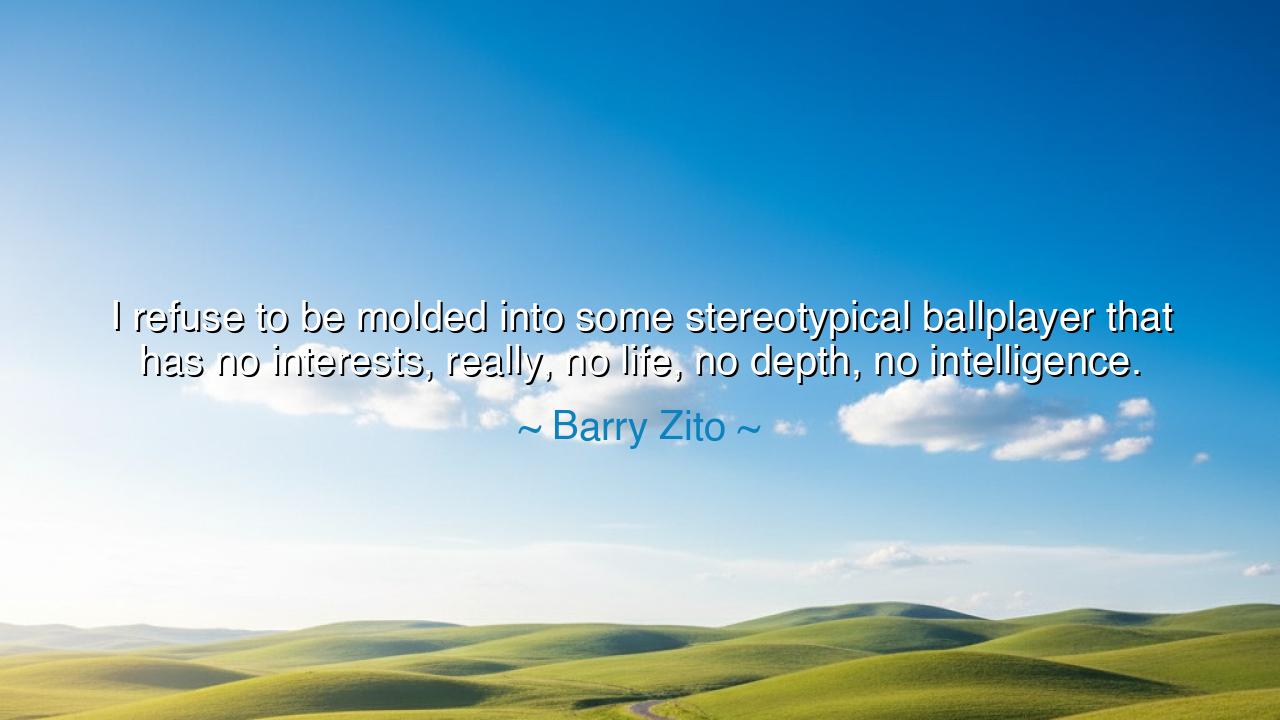
I refuse to be molded into some stereotypical ballplayer that has
I refuse to be molded into some stereotypical ballplayer that has no interests, really, no life, no depth, no intelligence.






“I refuse to be molded into some stereotypical ballplayer that has no interests, really, no life, no depth, no intelligence.” Thus declared Barry Zito, a man known not only for the curveball that baffled hitters, but for the spirit that refused to be confined by the narrow expectations of fame. His words ring with the eternal cry of individuality, the song of the soul that will not be caged. Beneath the tone of defiance lies a truth as old as the mountains—that every person must guard the sanctity of their inner life, even when the world demands conformity. For to be truly alive is not to please others, but to live with depth, intelligence, and authenticity.
Zito spoke these words during his years as a professional athlete, when the world around him sought to define him by numbers, victories, and contracts. Yet he felt the emptiness in such a measure. To many, a ballplayer was a machine of motion and strength—a symbol, not a soul. But Zito refused this illusion. He was a thinker, a musician, a seeker of meaning. His rebellion was not against the game he loved, but against the reduction of a man to a single purpose. In his voice we hear the same spirit that burned in the hearts of poets and prophets, those who would not let their identity be molded by expectation.
This battle between the self and the mold is ancient. Recall the tale of Socrates, the philosopher of Athens. The city demanded that he conform, to cease questioning, to accept the simple truths of the many. But Socrates, like Zito, refused to be shaped by the ignorance of the crowd. He declared, “The unexamined life is not worth living.” And for that refusal, he drank the poison cup. Yet his death was not a defeat—it was the triumph of a man who valued depth and integrity over acceptance. Zito’s words echo the same defiance: better to live as a thinking, feeling being than as a hollow idol.
In the modern world, where achievement is often mistaken for worth, Zito’s quote becomes a mirror for us all. How many are molded by the pressures of their professions—teachers who stop dreaming, artists who imitate, workers who silence their curiosity? The world praises efficiency and productivity, but rarely the inner richness that gives those things meaning. Yet a life without inner growth is like a tree that bears no fruit. Zito’s declaration is thus a call to live fully, to cultivate the intellect, the imagination, and the heart, even in the midst of worldly success.
There is also courage in such refusal. For when one chooses authenticity, one often stands alone. To be different is to be misunderstood. Yet history belongs to those who did not bend: Galileo, who stood by truth though the world mocked him; Rosa Parks, who refused to rise from her seat and thus lifted a nation; and countless others who refused the comfort of conformity for the fire of conviction. So too, in his own sphere, Zito reminded us that greatness lies not in uniformity but in the courage to remain oneself.
His words also carry a quiet wisdom about balance. A life devoted to one pursuit without reflection becomes brittle and joyless. Zito, who turned to meditation and music, discovered that the mind must be nourished as surely as the body. The soul hungers for art, for meaning, for connection. The ancient Greeks called this arete—the excellence of the whole being, not merely one part. It is the harmony between strength and wisdom, action and contemplation, body and spirit. Zito’s refusal was therefore not arrogance, but the preservation of his humanity in a world that sought to flatten it.
So, O listener, learn from this truth. Refuse to be molded by others’ expectations. Do not trade your intelligence for approval, your depth for comfort, or your life for an image. Cultivate your mind, explore your passions, and never apologize for being more than one thing. Be both dreamer and doer, athlete and artist, thinker and builder. For the world has enough imitators—it hungers for those who live with wholeness. And when you, like Zito, stand before the voices that seek to confine you, let your heart answer boldly: I refuse to be molded.






AAdministratorAdministrator
Welcome, honored guests. Please leave a comment, we will respond soon